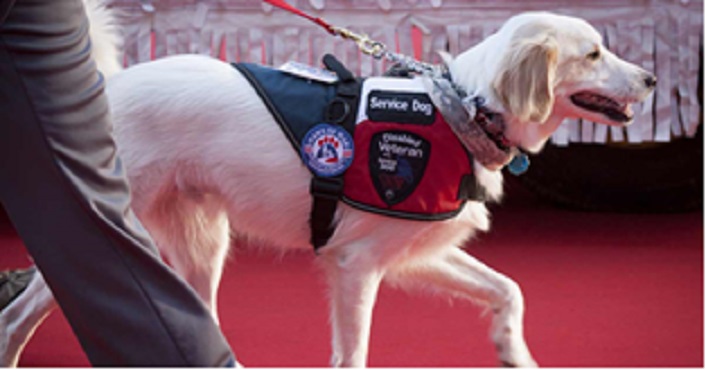VA has a long history of providing veterinary health benefits to significantly disabled Veterans who require and use a service or guide dog to mitigate their hearing, vision and/or mobility limitations. Currently, more than 600 Veterans with visual, hearing, or mobility impairments due to physical disabilities receive this benefit.
Many Veterans face problems in daily living due to mental health conditions that are not specific to any one diagnosis. A mobility service dog may help that Veteran negotiate these difficult situations in order to live a fuller, more satisfying life,” says Dr. Harold Kudler, VA’s chief consultant for mental health. The hope is that Veterans paired with a mobility service dog will experience improvement despite the fact that the mental health condition has been refractory to other treatment interventions.
Under an innovative pilot program, up to 100 Veterans with mobility impairments secondary to a mental health condition may be eligible for the benefit. The pilot program is coordinated and administered through Veterans Health Administration’s Center for Compassionate Innovation.
Veterans with substantial mobility limitations associated with a mental health disorder for which the service dog has been identified as the optimal way to address the mobility impairment may be eligible for the benefit that provides comprehensive coverage for health and wellness, prescription medication and dental care necessary to enable the dog to perform its duties in service to the Veteran.
The benefit also covers other needed expenses such as travel associated with training sessions with the mobility service dog, and essential equipment (e.g., harness). While VA does not provide Veterans with service or guide dogs, the veterinary health benefit provides the financial means for eligible Veterans to integrate a service dog into their lives.
To participate in the pilot, the Veteran’s interdisciplinary treatment team will evaluate and determine whether or not the mental health condition is primary in the Veteran’s significant mobility limitations. The team will also assess whether a mobility service dog would be the optimal intervention or treatment approach for the Veteran.
To learn more about the Service Dog Veterinary Health Benefit, including how to apply to receive the benefit, contact Prosthetics and Sensory Aid Services at VHAPSASClinicalSupportTeam@va.gov. To learn more about the Mental Health Mobility Service Dog Benefit Pilot, contact the VHA Center for Compassionate Innovation at VHACCISD@va.gov.
Additional information about VA’s service dog program can be found at http://www.prosthetics.va.gov/ServiceAndGuideDogs.asp

.
Topics in this story
More Stories
In this news post, we explore the various options designed to keep you in your home, offering hope and possible solutions for when/if you experience financial hardship.
Vietnam Veteran David Chee is among the many Native American Veterans and service members who have dedicated their lives to military service. Chee proudly served with the Army's 82nd Airborne, parachuting into the jungles of Vietnam. Chee now owns a home he purchased on Navajo tribal lands with the help of the VA Native American Direct Loan.
For Veterans, donating to charities—especially those that support fellow service members—feels like a meaningful way to give back to the community. However, Veterans and their loved ones must remain vigilant and learn to protect themselves from charity scams.







My service dog and I have been a matched team in Pocatello, Idaho for four years. He is two months shy of being eight years old. We were matched at Bergin University (BUCS) in California. My service dog is in great health and maintained daily. He needs a little dental care on his left upper canine tooth that has shown wear before we were matched. Since we have been together he does not get to chew on tennis balls which cause the tooth wear. I have not had the bid $2,500 for the tooth repair, and the care is available 3½ hour drive from my location. My VA doctor wrote a prescription for me to receive my service dog, but the VA was not charged for the cost of my service dog. Xander is a level 5 mobility service dog, and I am the second veteran matched with him. If we fit your study/program we would be interested in participating.
Thank you,
Steve and Xander